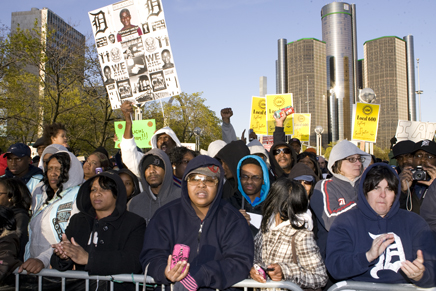 On March 26, thousands of people gathered at Hart Plaza in downtown Detroit for a justice rally for Trayvon Martin. According to Kevin Tolbert, international representative for the International UAW, between 1,500 to 2,000 people attended.
On March 26, thousands of people gathered at Hart Plaza in downtown Detroit for a justice rally for Trayvon Martin. According to Kevin Tolbert, international representative for the International UAW, between 1,500 to 2,000 people attended.
“We filled up the walkway at Hart Plaza from the UAW Ford Building down to the labor legacy monument.”
17-year-old Trayvon Martin, an African American, was shot and killed by a neighborhood watch volunteer named George Zimmerman on Feb. 26, while Trayvon was walking back to his father’s home from a store. He was carrying a bag of Skittles and a can of iced tea.
To date, Zimmerman, who claimed in a 911 call to police that Trayvon was a “suspicious character” and who pursued the youth against police advice, has not been arrested, owing to a “stand your ground” law extant in Florida.
The case has sparked national outrage and charges of racial bias.
There were many speakers at the rally.
“The speakers spoke to what we can do to connect the tragedies, from being upset and angry about what happened in Florida to being able to move toward action here in Detroit,” he said. “And action in improving the lives of young people around here, because we lost so many young people here as well.”
Several constituency organizations took part in the rally.
“We brought Detroit 300,” he said. “We asked the Detroit NAACP to be a part. We asked for United Communities of America to be a part. And all have different examples.”
He noted that United Communities of America has a city-wide Day of Peace.
“They’re proposing the 22nd of every month, that we have no crime and no violence,” Tolbert said. “So we’re asking people to volunteer and help be a part of spreading that message: go to schools and be active.”
Rev. Wendell Anthony, president of the Detroit Branch NAACP, said other groups in attendance included LA SED, the Arab Civil Rights League, Rainbow PUSH, National Action Network, Detroit Council of Baptist Pastors and Vicinity, and the Detroit Police Department.
During the rally, people were also encouraged to go to the website TakeactionDetroit.com and sign up. Tolbert said people would then be connected to the constituency groups that would be able to work on those projects.
“We also asked them to sign up for Detroit 300,” Tolbert said. “We gave them lots of opportunities and ways we thought they could be active in their community and in the city.”
Asked what all Americans — regardless of race, political leanings, or views on gun ownership — should take away from this tragedy, Tolbert recalled a message from Dr. Martin Luther King Jr.
“You can’t judge somebody simply by what they’re wearing and the color of their skin,” Tolbert said. “You can’t look at somebody, and on face value be able to tell what their intentions are simply because of the color of their skin. No matter what had happened in the past. You just can’t do that. So, you have to remember that lesson as one that we have been taught in this country over and over, but sometimes it tends to escape people.”
Rev. Anthony also quoted Dr. King: “An injustice to anyone anywhere is an injustice to everyone everywhere.”
“Trayvon Martin is a spark that can burn at the very conscience of all of us,” he said. “That’s why White folks, Black folks, Brown folk, Red and Yellow folk came out to support the cry for justice.”
Anthony added that it also suggests we haven’t arrived at a point in our society where we are judging each other by the content of our character as opposed to the color of our skin.
“A child is dead for no other reason than he wore a hoodie and he was an African American youth,” Anthony said. “The issue is not the hoodie; the issue is those who are really no good when it comes to how they interact and engage people who appear to be different. It means that we must work harder and smarter to end gun violence; to think before we act, and to act like we’ve been doing some thinking.”
Tolbert said young people were very moved by this tragedy.
“This is the first significant tragedy that most young people have seen on this level,” he said. “Though lots of people have died in similar circumstances, this is the first that’s gotten this much national attention. So we have to be able to give them outlet. That’s why we held the rally.”
Secondly, he said, they have to take advantage of that activism and energy and put the young people to work on things that will help improve their lives and our city.
“We can’t just watch the tragedies and say ‘oh, that’s horrible’ and not let people have a place to express themselves,” he said. “And then we have to also connect this generation to being out, being active and doing something, instead of just complaining about what’s going on in the world, and staying home and sitting on couches.”
Tolbert added that advocacy groups are meeting later this week to talk about their next steps, which are to take the people who signed up and to continue to push the messages of the three groups.
“We think one person might want to be in Detroit 300, but their cousin or brother, they don’t want to do Detroit 300. Well, maybe we can get them to volunteer with United Communities of America. Or maybe somebody else could volunteer with a register the vote campaign,” he said. “There’s got to be more activities and there’s something for everybody to be involved in. We just have to, as leaders, keep presenting those opportunities to people.”